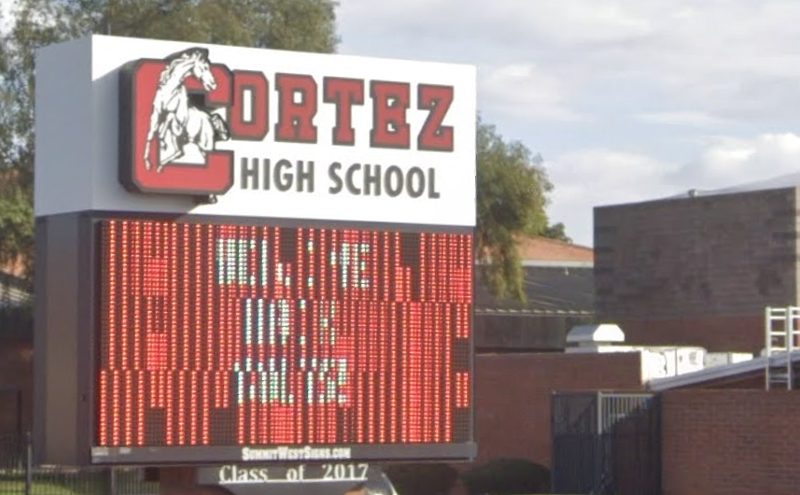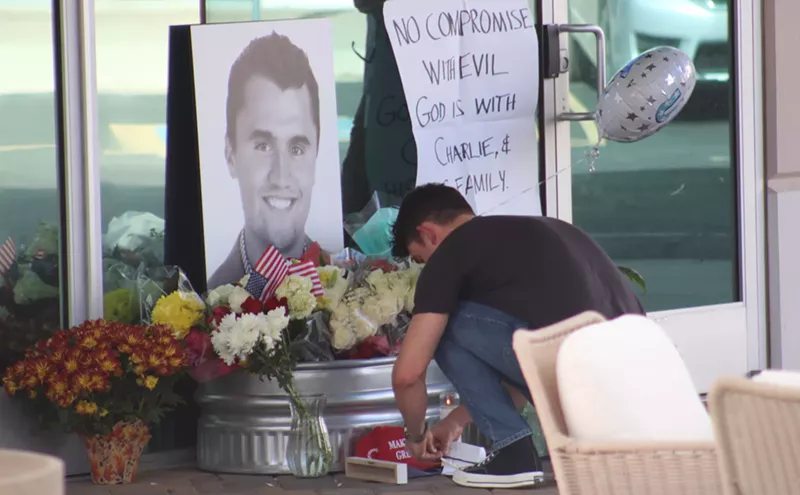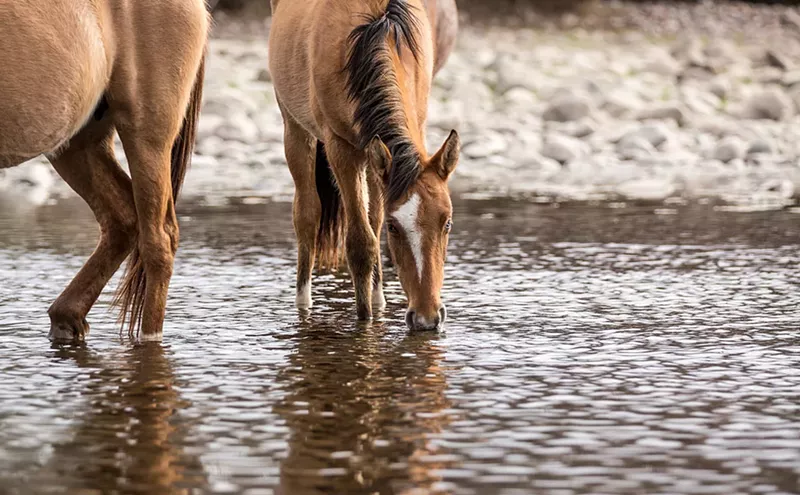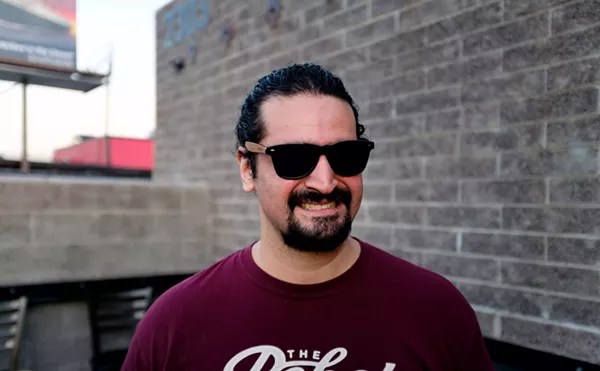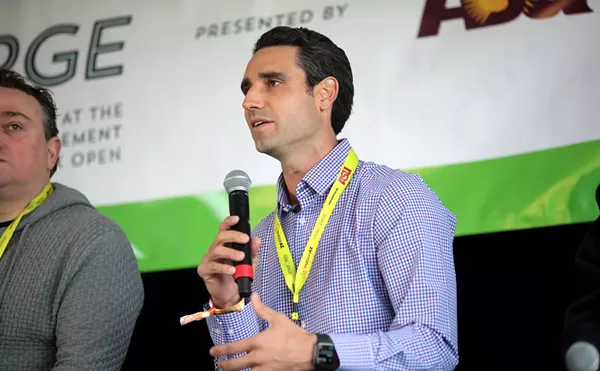And so it is more than a little odd that Dan Coleman is now having lunch at Macayo's in downtown Phoenix, asking the waiter to bring him a vat of the hottest salsa they have, please, and talking about illegal immigration.
Coleman, 35, is running for state representative. He looks the part, with his slightly doughy features and his standard-issue polo shirt, and his beliefs are run-of-the-mill Arizona Republican: He believes in the right to bear arms. He thinks Roe v. Wade was wrongly decided. He's in favor of the death penalty.
But there's something surreal about discussing the death penalty over lunch with someone who, just last year, was facing it. Not to mention that here's a guy who could still face charges for shooting an unarmed woman, but who volunteers, cheerfully, that he owns an arsenal of guns, including semi-automatics and silencers.
Indeed, there is something very strange about Dan Coleman, something that begs a few serious questions:
Namely, who shoots a woman in the head, kills her, gets the charges thrown out, and then decides to run for public office?
And, on a more basic level, who is this guy?
Even in this state of unlikely politicians, of car dealers who use words like "pickaninny" and blue-blood developers who leave office in disgrace after being charged with defrauding investors, it's possible there's never been a candidate with a résumé as bizarre as Dan Coleman's. And the strangest part of all is that Dan Coleman doesn't have a problem with that. Not one bit.
Because Coleman is convinced he didn't do anything wrong, he doesn't understand why the shooting should even matter, much less define him.
"When he said he was going to run for office, I warned him that they'd be trying to bring this thing up," says Coleman's friend Michael Hagerty. "And he said, 'Why should it matter with what I'm doing now?' He can't understand why it didn't go away quicker."
It's an odd lack of understanding for someone who lived for so many years in Cochise County, where people have spent the past 125 years hashing out Wyatt Earp and his gunfight. (Indeed, Coleman's stepfather is among the people who've devoted their lives to the hashing.)
And Coleman's defining moment, no matter how his supporters try to shade it, wasn't a showdown between a marshal and an outlaw. That, people might understand.
But while Coleman was arguably acting in self-defense, this was a showdown between an unarmed woman and a guy with a gun.
And so it's remarkable that only if prodded does Coleman express even the barest trace of regret over what happened that night in April 2003.
And that, though he didn't plan to run as a guy who'd been charged with murder, now that the word is out, he's not all uncomfortable using it for his own ends.
"I'd rather talk about the issues," Coleman says, fixing his blue eyes intently, then offering a careless shrug. "But if this is what gets me in the papers, I'll take this."
Even before the shooting, even before people in Cochise County had a good excuse to dislike Dan Coleman, they disliked him.
His friends will admit that. So does his stepfather. They just frame it somewhat differently — as jealousy. (The people who don't like Coleman, on the other hand, say they recognized him as a jerk even before he gave them irrefutable evidence to prove it.)
Coleman and his family were a big deal in Cochise County, once. His mother, Jane Candia Coleman, is a respected Western author, with books of poetry, memoir, and fiction to her name. His stepfather, Glenn Boyer, wrote a popular biography of Wyatt Earp's wife, Josephine, that only made Boyer more famous when his methods came under fire from historians. A relentless self-promoter, Boyer claims that his work alone "reestablished the reputation of Wyatt Earp," and, directly or indirectly, was responsible for a half-billion dollars in tourist money in Arizona.
Dan Coleman, too, used to be a big man around town. He flew in a private jet. He drove a Jaguar and openly pondered a political career; perhaps, as he wrote in an e-mail to a girlfriend, he'd run for sheriff.
But today the area bears no trace of Coleman or his family, other than the small stone memorial to Annette Chalker in the parking lot of the country store.
They've all left town.
Coleman's stepfather, Boyer, lived in this part of Arizona for 31 years and made his name chronicling its history, but he vows never to set foot in the county again. He's livid at the way local law enforcement handled his stepson's case.
He was so eager to get out, he says, that he accepted a low bid on his ranch.
"We took a quarter-million bath and left rejoicing," Boyer says.
No matter what side of this case you're on, it seems, you aren't happy about how it was handled. But that's skipping ahead to the ending.
The beginning, perhaps, is when Coleman first came to Arizona. He was 8. His family summered here, he says, and later, after his parents divorced, his mother moved to Cochise County from Pittsburgh, 15-year-old Dan in tow.
He wasn't sold on the West immediately. He went back to Pittsburgh for boarding school, and farther east, to Rutgers, for college. After college, he started a contracting company in New Jersey, but says it went bankrupt in 1995.
So his stepfather sent him a few grand and told him to come home. He was 24 years old.
The West quickly became Coleman's true spiritual home. It's evident in how he dresses — bola ties and cowboy hats — and how he thinks of himself. It's why he recently bought a place in New Mexico, in addition to his home in suburban Laveen. It also explains his politics: He has a Westerner's distaste for political correctness, to the point where he approvingly quotes Ann Coulter's infamous line about invading Muslim countries and converting everybody to Christianity — and this in spite of being not exactly religious himself.
Coleman worked a few years for the Cochise County engineer, then, at 27, started a computer consulting business in Phoenix. (Boyer was vice president.) In his telling, every government agency from the U.S. Postal Service to the state Department of Economic Security signed on as clients.
Even as business grew, though, and after he enrolled as an MBA student at Thunderbird, Coleman made a habit of flying down to his mother's ranch on the weekends.
At 3,723 square feet, not counting the guest quarters, the ranch house is one of the biggest places in town. It's nothing fancy, though, just a series of additions sprawling in every direction.
But it's serene. Nestled against the Chiricahua Mountains to the west, and the New Mexico state line and the smaller Peloncillo range to the east, it's only a few miles off Highway 80, but it feels adrift in a sea of mesquite, untouched by civilization.
The area's appeal is hampered only by its isolation. Nearly half the local traffic seems to be Border Patrol vehicles. The only amenities are just across the New Mexico border in Rodeo, population 200.
They're about as minimal as it gets: a bar, a cafe, a vintage-looking gas station, and a little historic plaque to commemorate the fact that a train used to pass through town.
"That's the only thing there is in this town: one bar," says Coleman's friend Hagerty, who's lived in Rodeo part-time for the past decade. "Other than that, you have to stay home and watch TV."
Perhaps because of that, local affairs can be inordinately contentious. After all, if there's only one bar, you can't avoid the people you don't like, not if you want a drink.
And a lot of people just didn't like Coleman.
"The world will forgive you everything but success," his stepfather, Boyer, concludes. "And he's a great success."
But the town's reaction to Coleman was more complicated than just jealousy.
Coleman's stepfather, Boyer, had made a number of enemies, and not all of them in Cochise County. Many were writers and academics who argued that his much-vaunted research was shoddy ("I Varied Wyatt Earp," Tony Ortega, March 4, 1999).
After New Times aired the case against Boyer, the University of Arizona stopped publishing his best-selling book — a situation that Boyer claims was his choice, but that Boyer's critics believe inflamed both Boyer and his stepson.
Allen Barra, a writer and historian who led the charge to discredit Boyer's book, says he was subjected to a steady stream of nasty e-mails from Dan Coleman, years after he and Boyer clashed.
"I was still getting them at this time last year," Barra says. "I had to stop my daughter from looking at the computer because you'd just never know what would be there."
Coleman could be his own worst enemy. After getting in a fight with one local couple, Coleman sent them an e-mail vowing to "make it my personal mission to see that this year is nothing but hell for you." (Coleman says he doesn't remember the e-mail.)
His arrogance could be galling. Linda Runion, a Michigan native, purchased the Rodeo RV and Country Store soon after moving to town. The first time she met Coleman, she recalls him asking if she needed to borrow money. When she declined, Coleman's friend laughed.
"You might as well," he told her. "Everybody else in town owes him money."
"We live in an area where a portion of the people are not very affluent," says Portal real estate agent Randy Norrick, who owned a small firearms dealership with Coleman and considers him a friend. "Dan was pretty affluent. And there is a certain amount of people who are jealous if you're obviously and openly extravagant.
"He wasn't extravagant by Phoenix standards. But this is a very conservative, rural county. And by comparison . . ."
And so it's no wonder that after the shooting, stories about Coleman's bad behavior were passed around town like baseball cards.
Robert Bernard, who ran the Rodeo Tavern, would later explain the situation.
"You know, he always carries a gun. . . . He would always let it be known and, over time, that was his trump card to everything," Bernard concluded in an interview with sheriff's deputies. "You know, he knew the buttons to push to get somebody angry, and then it was always . . . you know, the gun thing would come up."
Bill Cavaliere, who served as the sheriff of New Mexico's Hidalgo County from 1998 to 2002, says his deputies were summoned one night to the tavern. Angry at Coleman, one local man had threatened to go after his truck with a baseball bat.
And that, Cavaliere says, is when Coleman pulled out his gun.
"Since the guy was threatening to damage his vehicle, the D.A. said, 'Let's call it even,'" Cavaliere recalls.
"But then after he killed the Chalker girl, everyone came out of the woodwork, telling me that Coleman had pulled guns on them."
Gail was the first Chalker sister to arrive in Rodeo.
At 29, the Michigan native was looking for a change. After Linda Runion, an old family friend, moved to town, Gail followed suit in the fall of 2002.
People in Rodeo remember Gail as petite and pretty, but she was far from prissy. Like three of her four siblings, she'd followed her father into the drywalling business, and that's what she was doing in Rodeo — drywalling, painting, finishing.
Then she met Dan Coleman. And in pretty short order, she moved into his family's ranch, rent-free. When he came down on the weekends, he'd stay with her.
He was in love. At some point, he even proposed.
But Gail wasn't sure. She wavered, and other guys expressed interest. Coleman appeared to be tortured by her indecision.
In a flurry of e-mail messages to Chalker, which the sheriffs seized as part of their investigation, Coleman begged, pleaded and cajoled. "A beautiful gal like you should not be stuck with a fat drunk like me but I know that I want you," he e-mailed in March 2003. "And the way things are going I am pretty convinced that you don't want me."
Coleman even asked Gail to meet with his stepfather to discuss the situation, which her sisters found odd. But Gail agreed. Boyer tried to convince her to "take her chances," as he wrote in a follow-up e-mail, also seized as part of the investigation.
"I think Daniel needs you," Boyer wrote.
But unbeknownst to everyone, Gail's time in Rodeo was rapidly coming to an end — almost as soon as it had begun.
In February 2003, Gail's older sister Annette moved to Rodeo, her two little boys and her fiancé in tow.
Gail could be moody and shy, with a tendency to have panic attacks in times of stress. Annette, her friends say, was more mellow. She loved animals, especially horses. She liked to drink and liked a good joke.
Annette had gotten divorced as a young woman, then never married the father of her sons. Her friends and family members say that, at the time, the guy wasn't there for his kids, who now are 8 and 7.
But Annette never got too worked up.
"She was just a happy, positive person," says Linda Runion. "She liked to have fun. She'd talk to anybody. It didn't matter who they were."
Annette and Gail had worked together in Michigan for their brother's drywalling company. They'd planned to work together, again, in Rodeo.
But the sisters' relationship, once so easy, began to sour. The Chalkers didn't trust Annette's fiancé, Colby Rawson. And when Annette began flaking on work, Gail concluded that she must be on drugs. In the past she'd used cocaine; Gail thought maybe she was at it again.
Gail called their father to discuss her concerns, and soon after that, the oldest of the five Chalker siblings, Carol, was dispatched to Cochise County to check out the situation.
But the night all three sisters reunited, at the Rodeo Tavern, everything went wrong. When Carol pulled Annette aside to ask about the drugs, Annette didn't just deny it, she got angry — and confronted Gail.
And then they started arguing about the air compressor.
Gail had fronted Annette $500 for work that she hadn't gotten around to doing. And Gail was getting fed up.
So when Annette asked to borrow the heavy power tool to do some drywalling, Gail refused. Not until Annette made up the work she owed.
Everybody's recollections of the night get a little blurry at this point. (Everybody, after all, was drinking.) Colby Rawson says he and Annette were supposed to stop by Coleman's house that night to get the compressor. But others, including Gail, say that they only agreed to talk about it the next day.
What's undisputed is that Gail and Coleman left the bar for bed, tucking in Carol, Gail's older sister, who had passed out from the evening's festivities.
Then, less than an hour later, Annette and her fiancé packed up her kids in the pickup truck and drove to Coleman's ranch.
As Rawson would later recount to the sheriff's deputies, Annette knocked on the door. When there was no answer, she started walking back to the truck.
And then, Rawson said, the light came on.
"She waved at me and turned around and walked back," Rawson would recall. "I thought she was waving at me to get out of the truck. Well, I got out of one side and the little boy got out of the other side. . . . So I ran around and said, 'Kyle, hey, get back in the truck.' You know, 'I'm just going to help your mom load the compressor.'"
Rawson heard Annette open the door. She called out, "Where's Gailbert?" — the nickname she used for her little sister.
And then he heard a pop.
"I thought it was a door slamming or something," Rawson said.
He put the little boy back into the truck and walked up the porch into the house, with no idea that his entire life was about to change.
There, inside the house, was Annette.
"She's laying on her back, 20 feet from the door, bleeding profusely from a hole in her face," Rawson said. ". . . I went, 'Oh my God!' It was like, so unreal. I couldn't believe it was really happening. And I went over there and when — whenever her heart would pump blood, it would come out of that hole in her face.
"So I put my thumb on it and I . . . I couldn't believe it."
It took the police nearly an hour and a half to arrive on scene, and the EMTs weren't supposed to go into the house before police. So Rawson desperately performed CPR and tried to stanch the bleeding.
"The worst thing about it," he says now, "the thing that really got me — when I was on the floor doing CPR on her, he [Dan] was at the bar mixing a drink. Annette was the best thing in the world. But Gail wouldn't help me. Dan wouldn't help me. Nobody would help me."
Annette was pronounced dead before she ever reached the hospital.
The scene at the ranch was so confusing that, when deputies finally arrived, they handcuffed Annette's fiancé, Rawson, before they realized that it was actually Coleman who'd fired the gun.
And as for Dan Coleman, he invoked his Miranda rights. At the advice of his lawyer, he wouldn't answer any questions.
If roles had been reversed, and Annette Chalker had been a man and Dan Coleman a woman, there is no question things would have been different in the aftermath of the shooting.
After all, Annette did barge into Coleman's home while he was sleeping — and she had exchanged fiery words with her sister earlier in the night. Gail Chalker, the only eyewitness inside the house, would tell deputies that her sister had been belligerent and violent when she entered the house.
But while no one would think twice about forgiving a woman for shooting a male intruder in the head, they don't necessarily cut a man the same slack.
Coleman is six feet tall. While Annette Chalker was a drywaller who was used to working with her hands, she was only 5'8". She also had no record of attacking anyone.
Forensic tests would also show that, despite her sister's concerns, she had no drugs in her system. (With a 0.17 blood alcohol content, however, she was well over the legal limit.)
Coleman's refusal to talk may have convinced the deputies that he was hiding something. But Gail Chalker's statement put them in a quandary.
Gail has made numerous statements about the case over the years, including a deposition in her parents' wrongful-death suit against Coleman. (He settled.) But it's a videotape she made two days after the shooting that provides a visual testimony to the anguish she felt over her sister's death — and her immediate recollection of the event.
The video was filmed by Coleman's stepfather, Boyer, in his Tucson home. It records both Boyer and Coleman's mother as off-camera voices, prodding the surviving Chalker sisters to explain what they'd witnessed.
Carol Chalker refuses to answer any questions. When Boyer pushes, she announces, "I can't do it," and steps off camera. After drinking too much at the bar, Carol had slept through the shooting anyway.
But Gail, who was still involved with Dan Coleman, tried to be more helpful. Looking pale, and trying to fight off a panic attack, she describes being half asleep when she was aroused by a slamming door, then Dan Coleman calling out, "Who the fuck is in my house?"
She and Dan sprang out of bed. Since Gail was naked, she grabbed a shirt and held it in front of her.
As they came out of the bedroom, Gail says on tape, Annette cried, "You fucking bitch!" and reached for her throat.
"Her sister went for her throat, to try to strangle her," Glenn Boyer helpfully intones.
"I was holding my shirt," Gail says. "I think I dropped it — I reached for her — I never even, I remember reaching for her. I don't remember touching her.
"Dan was pushing her — and from that point I don't remember seeing from then. I think I reached for my shirt to put it on. I heard a shot — I remember standing there, buttoning my shirt, and seeing Annette laying there, and I remember looking at her legs and seeing no movement."
Then, on tape, Gail begins to weep.
"I think Dan was leaning over her. I didn't know if she'd fallen, if he'd pushed her — I didn't know."
As Gail describes it, the struggle was hardly a matter of life and death. Even if Annette "reached" for her sister's throat, she left no bruise marks. On the tape, even Gail indicates that she was never close to being strangled.
But the law on this point is complicated.
After all, by Gail's account, Annette did barge into the house. And the law allowed Coleman to arm himself to defend against an intruder.
Once he was allowed to brandish the gun, if it went off accidentally in the heat of the moment, he was legally covered in a way he wouldn't be on the street, says his attorney, Matthew Borowiec.
The sheriff's department may not have wanted to acknowledge that. That very morning, they arrested Coleman and charged him with first-degree murder.
Boyer believes the sheriff acted out of hatred toward his family. Boyer had complained, five years before, about a deputy who trespassed on his property, gun cocked. He believes the department had it in for him, and his stepson, ever since. (The Cochise County detective on the case did not return calls for comment.)
"Vindictive and malevolent and crooked," Boyer says of the department's actions.
And maybe Boyer is right. Hagerty, for one, says the officer who interviewed him was interested only in dirt on Coleman.
"He dismissed me because I wasn't knocking Dan the way they were in town," Hagerty says.
But maybe the sheriff was simply troubled by the idea of a man shooting an unarmed woman — a man who then refused to answer any questions about his actions. And it couldn't have helped to hear all the stories from people in Rodeo who hated Coleman.
Either way, it would take Cochise County Judge Wallace R. Hoggatt just two months to throw the charge out. The prosecutors simply hadn't presented enough evidence for first-degree murder, he wrote. He sent the case back for the prosecutors to gather more evidence, or drop entirely.
But that didn't mean Coleman was home free — or that he was ready to apologize and move on.
After Judge Hoggatt threw out the murder charge, Coleman didn't respond by thanking God that he'd been let off the hook after a relatively short ordeal.
Nor did he publicly mourn the fact that he'd killed someone, whether his actions were legally defensible or not.
He was indignant about how he'd been treated. And he was ready to pick a fight.
"I think he'd been in shock after it happened," says Randy Norrick. "And the unfortunate thing is that, immediately, he had to deal with his defense. . . . You get to the other side of it, where you get angry that you're being prosecuted, beyond what the law should be.
"I think that's really incredibly difficult to deal with," Norrick adds. "One day, you're making a lot of money. And the next day, you're in jail. And people don't realize how fast the money goes."
Coleman believed that he had been wronged. And it didn't feel like an innocent mistake.
In January 2004, he filed a letter notifying the county of his intent to sue over its "malicious prosecution." He'd spent $40,000 in legal fees, he wrote, and lost a contract with the Arizona Department of Economic Security.
He would settle, he wrote, for $1.8 million.
Then, in April, he filed a libel suit against Annette's closest friends, Colby Rawson and Linda Runion.
The suit doesn't accuse them of spreading lies to the media. (Both say they never talked to a single reporter.) Instead, the suit focuses on statements they made to the sheriff's detectives — and rumors they supposedly spread around town.
Coleman never did sue the county. And his suit against Rawson and Runion ended up backfiring, badly.
He almost won on default, since Rawson and Runion were too broke to hire an attorney. But then they found Rick Gonzales. A veteran of the Tucson scene, Gonzales had represented Annette Chalker's young sons in the family's wrongful-death suit.
He had no respect for Coleman — and no fear of him, either.
"I was a public defender," Gonzales says. "I knew this was not a killer. In my sense, through everything I gather in looking at this case and the people that I talked to, he was nothing more than a bully. This was a bully who's always had his mommy and daddy to cover his butt."
Once Gonzales signed on to defend the libel charges, he called Coleman for a deposition. Specifically, he wanted to ask about something that Linda Runion claimed Coleman had told her just after the murder: "I shot the fucking bitch."
But Coleman, facing the possibility that the county would refile criminal charges, was forced to plead his Fifth Amendment right against self-incrimination.
And that made it impossible for Coleman to prove that Runion was lying — or even proceed with the suit. Gonzales says the judge issued a ruling for his clients. Coleman, he says, may now be on the hook for as much as $27,000 in legal fees.
By then, though, the libel suit was the least of Coleman's worries — because, to Coleman's shock, Cochise County Attorney Ed Rheinheimer was building another criminal case against him.
Rheinheimer wasn't in office at the time of the first charges. But he'd been bothered by the way the charges had been dismissed so quickly, and he assigned a young prosecutor to look into building a better case.
At first, it looked like they had something. When prosecutors asked the grand jury for a charge of second-degree homicide, the grand jury returned a more serious bill of first-degree homicide.
But that was also the same charge the judge had thrown out before. And this time, it met a similar fate.
Coleman was now represented by longtime Tucson attorney Stanton Bloom. Bloom pointed out numerous procedural errors on the prosecutor's part, most notably the fact that he continued to present evidence while one grand juror took a bathroom break.
The mistakes didn't speak to the quality of the case, but they were enough for a good defense attorney to argue that the prosecutor's case was unfairly tainted.
Sure enough, Judge Hoggatt dismissed the charges. But when Bloom begged him to throw the case out for good, Hoggatt refused. Rheinheimer could return immediately to the grand jury, if he chose.
Instead, however, the case collapsed.
Rheinheimer says he received some bad news right around the time of Hoggatt's decision. Previously, prosecutors had been convinced that Coleman fired the gun at a distance — which would destroy the idea that the gun had gone off accidentally as Coleman defended himself.
But forensic testing didn't prove that point, as prosecutors had hoped. Instead, Rheinheimer says, the tests were inconclusive. The gun might well have been fired at close range.
With Gail sticking to her story, and the forensic tests inconclusive, the county attorney didn't have much.
"When you look at this situation, where you have someone shooting a person who's unarmed, the first reaction you have is that, 'This doesn't happen without someone committing a crime,'" Rheinheimer says. "That's the emotional reaction — and it's also the educated reaction, because that's usually the case.
"But if you accept Coleman's explanation, then there is no crime there. And we couldn't prove it didn't happen that way."
Because Judge Hoggatt left the door open, even now Cochise County prosecutors could, conceivably, file charges against Coleman. Maybe a lesser charge, like manslaughter, but a criminal charge nonetheless.
Most men, it's fair to say, would take that as a good reason to lie low.
But lying low has never been Dan Coleman's way. This past March, just 18 days after Hoggatt's final ruling, Coleman filed papers to run for the statehouse.
Some friends urged him to think twice.
"I didn't think it was a great idea," Norrick admits. "I just didn't know how it would play." Asked whether he tried to dissuade his stepson from running, Boyer offers an uncharacteristic "no comment."
Coleman's plans, not surprisingly, inspired great mirth in Cochise County. Bring up his name at any county office, and clerks will immediately ask if the rumors that the Dan Coleman is running for office can possibly be true. Down at the Cafe Rodeo, a waitress who gives her name as "just Tessa" says the news immediately sent her to the phone.
"I was like, 'Oh my God,'" she says, eyes wide. "I've gotta make sure I call my uncle, my sister and my cousin in Phoenix and make sure they don't vote for him!"
Far from being sheepish about his past, however, Coleman charged into it, head-on. Indeed, one of his first contributions came from Borowiec, his defense attorney on the first set of charges.
Borowiec confirms that, yes, it's highly unusual to give a former murder defendant a campaign contribution. But Borowiec likes Coleman well enough that he also wrote a testimonial for his Web site.
The site identifies Borowiec only as the former "presiding judge" for Cochise County; it doesn't mention his role on Coleman's murder case.
"His personality is maybe a little abrasive," Borowiec says. "And maybe he rubs people the wrong way. But he's very bright, well-educated. He's got a pretty darn good background.
"He's a very able person, and he just happens to be, in my opinion, a victim of an unfortunate accident, for which some people want him prosecuted."
If having a thick skin is essential to succeeding in politics, Dan Coleman may be well on his way.
He is surprisingly amenable, even when questions get tough. He agrees to an interview, a photo shoot, a roster of follow-up questions. He willingly turns over correspondence that paints him in an unflattering light.
That's not to say he's the least bit self-critical. One reason he responds so easily to attacks may well be his unshakable belief in his own righteousness.
Take the Chalker family.
While she and Coleman have broken up, Gail Chalker continues to support his innocence. She declined an interview with New Times, but issued this statement:
"It's been more than three years since Annette's death, and it's still hard for me to talk about it. There's not a day that goes by that I don't think about my sister and all the pain and suffering my family has had to endure.
"The fact is, her death was an accident, and Dan Coleman is innocent. I miss Annette, and she will always be in my heart."
But the other Chalkers universally blame Coleman for Annette's death. They acknowledge that their feelings have put a major strain on their relationship with Gail, but they want to see Coleman prosecuted.
And while even Coleman's staunchest supporters take pains to acknowledge the family's anguish, Coleman himself won't go there. He calls Jerry Chalker a "bitter old man."
His attitude seems far too strident. After all, he's not talking about some showdown at the O.K. Corral, some outlaw who needed to be faced down.
Even though Annette Chalker was drunk, even if she was belligerent, she was his girlfriend's sister, a single mother, another man's fiancée.
It's clear just from her sister Gail's statement how devastating her death has been to the people who loved her.
Coleman's refusal to acknowledge her loss doesn't just seem like bad politics. It seems heartless.
But the closest he comes to expressing remorse is a statement that's more defiant than apologetic.
"I don't think this hurts my reputation," Coleman says. "I don't think the events of three years ago — I don't think I did anything that anyone would be ashamed of."
He doesn't pause before charging into the next thought.
"Do I regret what happened? Yes. Do I wish I'd done things differently? Yes. Am I going to hide my head in the sand? No."
Talking to him, one thing is clear: It doesn't matter what his critics say. Dan Coleman has made his peace with his actions.
Win or lose this November, that's not going to change.
"A drunken, belligerent person breaks into your house at 1 a.m. — and attacks you and your family — what do you do?" he asks, then answers his own question.
"I'm going to act to protect my family every time."




